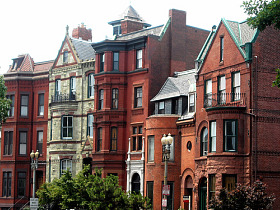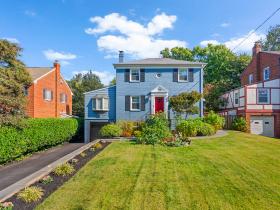What's Hot: Did January Mark The Bottom For The DC-Area Housing Market? | The Roller Coaster Development Scene In Tenleytown and AU Park
 Predictions '10: What Will the Next Year Look Like?
Predictions '10: What Will the Next Year Look Like?
✉️ Want to forward this article? Click here.

It looks like the residential real estate market in 2010 will either be really good or really bad – depending on whom you ask, of course.
On the national level, many of the factors that played a role over the previous year will continue to affect the level of activity we see in 2010. The homebuyer tax credit will continue to prop up the lower end of the market where first-timers are buying, and it will also probably lead to an increase in sales on the higher end, as current homeowners trade up for larger, more expensive digs.
Historically low interest rates that have made monthly payments lower (and homes more affordable) may be a thing of the past. Unless the feds continue to take steps to juice the credit markets (with inflation looming, they may or may not), interests rates will continue to creep back up, and settle in at a more sustainable number, likely in the 6 percent range.
According to Fannie Mae CEO Michael Williams, foreclosures are still on the rise, and that trend will worsen in 2010. He warns of a backlog of inventory – not just the so-called “shadow inventory” that banks are holding from the market, but also from the millions of US homeowners that have simply stopped making their mortgage payments and have been unsuccessful at refinancing. Because so many homeowners are in a negative equity position, and as banks become more flexible and willing to work with underwater homeowners, 2010 may become the “Year of the Short Sale.”
Lawrence Yun, chief economist of the National Association of Realtors (and often the source of consumer eye-rolling), has a much more optimistic outlook to the housing market. At a December press conference, he predicted sales activity to continue to rise by as much as 15 percent in 2010, national inventory to shrink to a 6 to 7 month supply, and even a modest 3 to 5 percent appreciation on home values by the end of the year.
The Washington area will likely be affected by trends of its own. Although financial markets are working their way through a lot of the lending issues that became prevalent in recent years, Coldwell Banker’s Nate Guggenheim believes that 2010 will still be a great year for well-qualified buyers. He noted that “buyers are out there and the inventory is not,” and therefore well-priced properties will continue to receive multiple offers.
Gerard DiRuggiero of UrbanLand Company, a real estate brokerage firm for new developments in DC, tells UrbanTurf that several of his developer clients are expressing interest in small, 4 to 6 unit projects. He said that they recently sold two land parcels to condo developers, and have seen quite a bit of interest in two other parcels they have available. DiRuggiero believes the DC condo market saw its bottom in the spring of 2009, but because the commercial lending environment is still tight, particularly for large products, he thinks the area “probably won’t see any large developments being planned in the near future.” But he predicts that an already tightening inventory will continue to shrink, due to the favorable interest rates and the federal tax credits that created the same demand seen in the second half of 2009.
Conflicting trends and the lack of a crystal ball make predicting real estate very difficult, but UrbanTurf is interested in hearing your opinions and predictions about this coming year’s market. Please post your thoughts in the comments section.
See other articles related to: dc area market trends, dclofts
This article originally published at https://dc.urbanturf.com/articles/blog/predictions_10_what_will_the_next_year_look_like/1642.
Most Popular... This Week • Last 30 Days • Ever

As mortgage rates have more than doubled from their historic lows over the last coupl... read »

The small handful of projects in the pipeline are either moving full steam ahead, get... read »

The longtime political strategist and pollster who has advised everyone from Presiden... read »

Lincoln-Westmoreland Housing is moving forward with plans to replace an aging Shaw af... read »

A report out today finds early signs that the spring could be a busy market.... read »
DC Real Estate Guides
Short guides to navigating the DC-area real estate market
We've collected all our helpful guides for buying, selling and renting in and around Washington, DC in one place. Start browsing below!
First-Timer Primers
Intro guides for first-time home buyers
Unique Spaces
Awesome and unusual real estate from across the DC Metro














